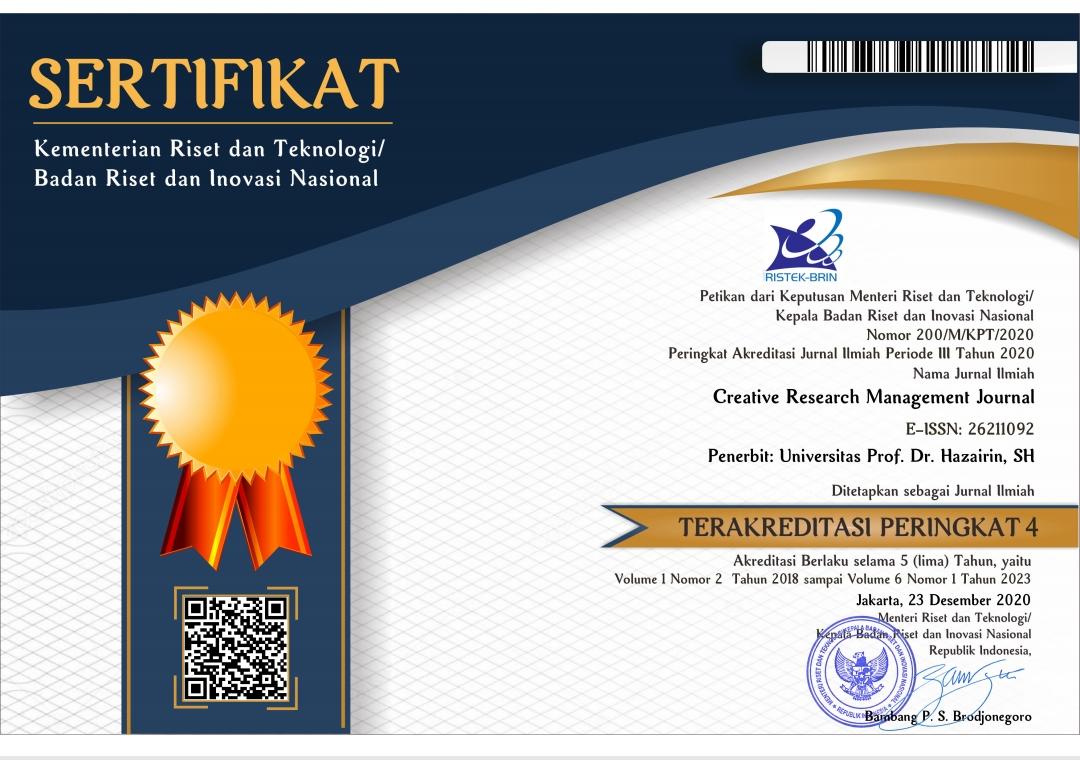PERAN MANAJEMEN KEUANGAN UMKM DI KOTA BENGKULU SEBAGAI STRATEGI PADA MASA NEW NORMAL COVID-19
DOI:
https://doi.org/10.32663/crmj.v4i1.1923Keywords:
Financial Management, UMKM, SWOTAbstract
In general, this study aims to provide knowledge to UMKM owners in Bengkulu City to be able to survive and thrive in running a business by paying attention to and applying the principles of good and correct financial management. This study uses a descriptive research method with a qualitative approach.The population in this study were 1286 SMEs in Bengkulu City. The method of determining the sample uses the slovin formula, so as to get results as many as 93 MSME actors. From the results of the new slovin formula, a sample of 45 SMEs was taken with a purposive sampling technique. Data collection techniques with interviews, and questionnaires. The results of this study are that there is still a lack of application of financial management carried out by UMKMowners, namely only by recording incoming and outgoing money and still not using good andcorrect financial management principles such as budget utilization, financial recording, financial reporting and control. This is because UMKM owners feel that managing finances is too difficult and inconvenient. Apart from that, ignorance of the importance of doing financial management factors is also one of the UMKM owners not implementing financial management. This study also conducted a SWOT analysis which resulted in 5 main strategies related to financial management that could be carried out by UMKM owners in Bengkulu City
References
Handoko, Hani. (2011). Manajemen: Edisi Kedua.Yogyakarta: BPFE.Hardilawati, W. L. (2020). Strategi Bertahan UMKM di Tengah Pandemi Covid-19. Jurnal Akuntansi & Ekonomika. 10 (1), 89-98.Kasmir. 2013. Analisis Laporan Keuangan. Rajawali Pers: Jakarta.Kuswadi. 2005. Cara Mudah Memahami Angka dan Manajemen Keuangan bagi Orang Awam. Jakarta: Elex Media KomputindoPuspita, V.Fauzan. Triyanto, D. (2020).Peran Generasi Milenial Dalam PengembanganIndustri Kreatif Sebagai Upaya PenanggulanganKemiskinan di Kota Bengkulu. Pareto : Jurnal Ekonomi dan Kebijakan Publik. 3(2)51-66.Rahman, F. (2017). Peran Modal Manusia dan Modal Investasi Terhadap Nilai Produksi Industri Kecil Di Kota Pekanbaru. Jurnal Benefita: Ekonomi Pembangunan, Manajemen Bisnis & Akuntansi, 2 (1), 1-9.Suryana. (2011). Kewirausahaan Pendoman Praktis : Kiat dan Proses Menuju Sukses. Jakarta : Salemba Empat.














